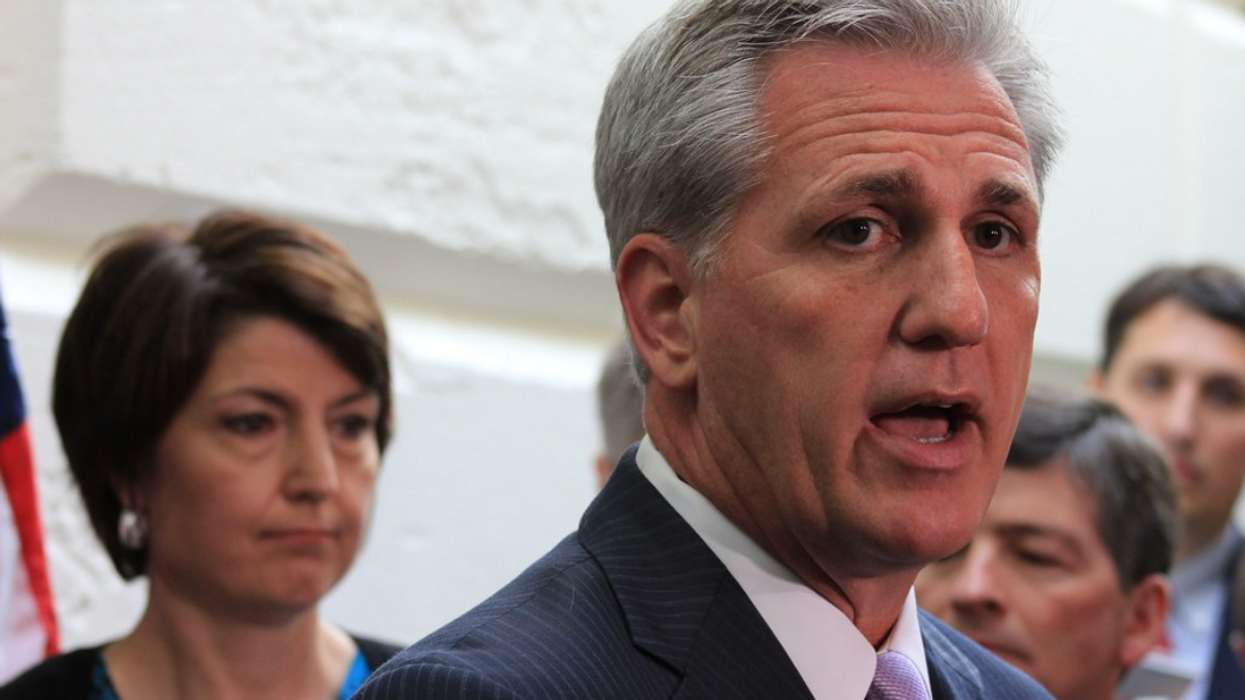In Midterm Ads, Republicans Push Debunked Lie About '87,000 IRS Agents'

Rep. Kevin McCarthy
"Liberal Cheri Beasley is coming for you," falsely claims an attack ad released Tuesday by the Republican-affiliated super PAC Senate Leadership Fund, "with higher taxes on almost everyone and an army of new IRS agents. Beasley backs the liberal scheme to spend billions auditing the middle class." The words "...hiring 87,000 new IRS agents" is displayed on the screen.
After Democratic leaders in Congress struck a deal in late July to pass the landmark Inflation Reduction Act, Republicans began repeating variations of the widely debunked lie that the legislation will fund the hiring of 87,000 new IRS agents who will target the middle class.
GOP incumbents, candidates, and campaign operatives have repeated the number again and again in television ads, press conferences, Facebook posts, and tweets, but continually repeating the lie doesn't make it true; fact-checkers at a large array of media outlets have debunked the claims.
IRS Isn't Targeting Middle And Lower Income Americans
An Aug. 11 PolitiFact analysis noted that while a preliminary Treasury Department plan in May 2021 had suggested that the IRS could use $80 billion in funding to hire 86,852 new employees, not all of those positions would be agents or auditors.
Instead, the hiring wave would replace close to 50,000 people expected to retire over the next few years, according to Natasha Sarin, the department's counselor for tax policy and implementation, who was quoted in the report.
Another GOP claim is that the new 87,000 agents would be armed — this is also false. Reuters shot it down, noting that only a small fraction of the agency's staff are authorized to carry guns.
Time magazine noted in its fact check that new auditors would be specifically focused on cracking down on wealthy tax cheats and corporations that evade the law — not on middle-income families or small businesses.
An August. 10 letter from Treasury Secretary Janet Yellen expressly instructed IRS Commissioner Charles Rettig to ensure that "any additional resources—including any new personnel or auditors that are hired—shall not be used to increase the share of small business or households below the $400,000 threshold that are audited relative to historical levels."
Debunked, But Disinformation Is Still Being Repeated
Despite the fact checks, the 87,000-agent lie has been ubiquitous.
House Minority Leader Kevin McCarthy and members of his caucus posted the lie that there would be so many additional IRS agents that they would not all even fit in large sports arenas.
Arizona Rep. Debbie Lesko incorrectly claimed that by backing the energy, climate change, and health care package, Democratic lawmakers had voted to "double the size of the IRS"; Virginia Rep. Bob Good claimed that the bill would fund "87,000 armed IRS agents"; and Ohio Rep. Troy Balderson baselessly said that it would bring "87,000 more IRS agents to spy on you."
Others repeated the falsehood that those mythical 87,000 new agents would go after "the working class," "small businesses," and "middle income families."
It has appeared in ads run by the campaigns of Sen. Ron Johnson (R-WI) and North Carolina Republican Senate nominee Rep. Ted Budd; it has been used in Senate Leadership Fund attack ads in Georgia, Nevada, New Hampshire, North Carolina, and Ohio; and the right-wing Club for Growth Action and Congressional Leadership Fund have run spots lying about the number of new IRS agents.
The Senate Republican conference's official Twitter account and those of dozens of other House and Senate Republicans have also tweeted the bogus 87,000 number.
Fixing A Broken Agency
In recent years, the IRS has seen massive budget and staff cuts, the result of a concerted campaign by congressional Republicans to demonize and starve the agency, including by cutting the agency's budget by 20% in 2010.
The result? Out-of-date technology, widespread processing delays, and insufficient customer service staff to even answer taxpayers' phone calls. It also meant a huge drop in audit rates for large companies and millionaires.
Rather than back legislation to fix these problems, Republican lawmakers have used the troubles they helped cause to further attack the IRS.
The Inflation Reduction Act, passed by the Democratic majorities in the House and Senate and signed into law by President Biden in August, will provide about $79 billion in additional funding over a decade to address these challenges. Not a single Republican lawmaker voted for the package.
The law did not raise taxes for anyone making under $400,000 a year.
Published with permission of The American Independent Foundation.








